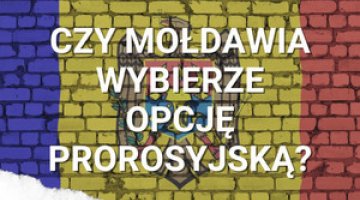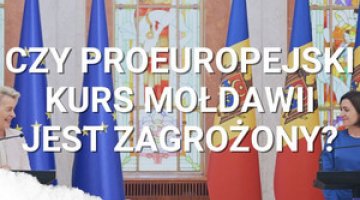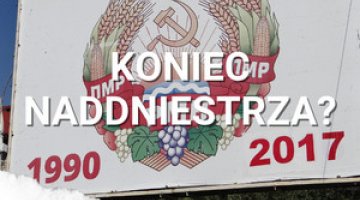Moldova ahead of the elections: mobilisation of the pro-Russian opposition
Recent weeks have seen a major revival on the Moldovan political scene. This is linked with the presidential election scheduled for 20 October and the accompanying referendum on Moldova’s accession to the EU. At the end of April, in Moscow, Moldova’s pro-Russian political parties controlled by Ilan Șor, a politician who has fled the country and is currently in hiding, formed a joint electoral bloc. Meanwhile in Chișinău, representatives of other opposition forces, which are effectively pro-Russian although proclaiming themselves to be pro-European, launched talks on choosing a joint presidential candidate. At the same time, the ruling pro-Western Party of Action and Solidarity (PAS) is trying to overcome Moldovan voters’ growing disillusionment with the ruling camp. This mood is evident in the declining approval ratings for President Maia Sandu, who will seek re-election and is supported by PAS. Although a win for her still seems the most likely scenario, it is not as certain as it was just a few months ago.
Uncertain re-election
In recent months, Moldova has seen growing public dissatisfaction with government policies. This has translated into a decline in the approval ratings for the ruling camp’s de facto leader, President Sandu. While only a few months ago polls indicated that in the second round of presidential election she would win against any contender, and even in the first round against some of them, this scenario is no longer certain. The decline in her level of support is mainly due to a high inflation rate and rising energy and gas prices. Last winter gas prices paid by individual customers were four times higher than in 2021, when PAS had just taken power; and the rate of inflation, which in mid-2022 stood at more than 34%, only fell below 10% in August 2023. The ruling party has failed to provide an acceptable explanation for these price increases. The failed attempt to reform the judiciary, which was PAS’s flagship electoral promise, has also significantly tarnished the party’s reputation. Not only has the reform failed to produce any tangible results, but it has also provoked administrative chaos: from 2022 until May 2024 there was only a single acting prosecutor general, and the committee which was established to verify the integrity of judges and prosecutors has proved ineffective. The government has also failed to meet the public’s expectations as regards bringing to justice the corrupt politicians and oligarchs who ruled or co-ruled Moldova over the past several years.
Thus, PAS has attempted to focus the ongoing campaign primarily on European integration by presenting the launch of accession talks with the EU as a key achievement of the government. To achieve this, it has decided to combine the presidential election with a referendum on Moldova’s EU accession, which is supported by around 60% of the population. The party has been holding regular pro-European marches and rallies, and has used the recent frequent visits of high-ranking EU and US politicians to Moldova as arguments supporting its electoral campaign.
Consolidation of the opposition at home…
At present, the Moldovan opposition is split into three main camps. The first includes pro-Russian parties led by the Party of Socialists of the Republic of Moldova (PSRM). The second encompasses ‘centrist forces’ which, despite being declaratively pro-European, are reluctant to antagonise Russia. At the same time they have emphasised the importance of Moldova’s neutral stance on the war in Ukraine. These parties main common factor is their desire to oust Sandu and PAS from power.
There is no doubt that Moldova’s former president and PSRM leader Igor Dodon has the ambition to act as Sandu’s contender. Although he officially argues that his party is willing to support a joint ‘non-party’ opposition candidate, he himself enjoys the support of around 15% of the electorate. This ranks him second after Sandu, who can count on around 30% of the vote. If these two politicians were to compete in the run-off, their chances of winning the election would be even.
Representatives of the parties representing the latter camp met in Chișinău in mid-May to discuss the possibility of nominating a joint candidate in the presidential election. The meeting was organised by disgraced Moldovan journalist Natalia Morari who has links with Veaceslav Platon, a businessman who has fled the country and is in hiding in the UK. He is accused of involvement in the theft of $1bn from Moldovan banks back in 2014. It seems that so far these talks have failed to produce any clear results, but the plan to nominate a joint candidate is still on the table.
Other politicians who have also declared their intention to run in the election include Vlad Filat, former prime minister and leader of the pro-European Liberal Democratic Party of Moldova (PLDM), who was convicted in 2015 for his involvement in the money stealing scandal, and Andrei Năstase, an independent politician and former head of the pro-European Dignity and Truth Platform (DA). Other possible candidates include former prime minister Ion Chicu, who has links with Dodon, and Irina Vlah, the former başkan (the equivalent of president) of the Gagauz Autonomy and currently leader of the centrist Platforma Moldova party, which is in favour of Moldova maintaining its neutrality. Although these politicians pose no serious threat to Sandu (their level of support is around 1%), their collective participation in the election is intended to strip the incumbent president of some of her votes and prevent her from winning in the first round.
Chișinău’s mayor Ion Ceban has withdrawn from the electoral race. Until recently, he had been viewed as one of Sandu’s potential main contenders. According to polls, in the run-off he could have counted on receiving around 35% of the vote, while the incumbent president could have received around 40%. Ceban represents the formally pro-European National Alternative Movement (MAN), which was established in 2023 in opposition to the ruling PAS party. However, its pro-Western slogans are frequently challenged; Ceban’s roots lie with pro-Russian parties, and he used to be a long-term member of the Party of Communists and subsequently of the Party of Socialists (in 2019 he was elected Chișinău’s mayor with the support of this party). When PAS took power, he began to distance himself from his original political camp. Despite this, the ruling party’s politicians and a portion of the expert community view him as someone who may be representing Russia’s interests. Although Ceban was allegedly considering standing in the presidential election, he viewed the campaign more as a method for boosting the MAN party’s popularity, with the long-term aim of increasing its chance of being elected to parliament in the elections planned for mid-2025 and becoming a potential coalition partner for PAS. His withdrawal is likely due to his fear of a weak result in the first round of the election (if Dodon also stands, Ceban could count on receiving just 5–8% of the vote) and its negative impact on his party’s approval rating.
…and abroad
The third opposition camp includes the parties centred around Șor, who fled the country in 2019 and was convicted on a charge of involvement in the 2014 banking scandal. This businessman and politician enjoys open support from the Kremlin (in February 2024 he relocated to Moscow from Israel, where he had been in hiding since 2019, and was granted Russian citizenship) and the Russian media. On 21 April, at his initiative, a founding congress of the Victory bloc was held in the Russian capital. It groups the parties controlled by Șor, including organisations such as the Revival Party and the Chance Political Party. Șor also supports Evghenia Guțul, the current leader of the traditionally pro-Russian area of Gagauzia (an autonomous region in southern Moldova), who attended the event. According to polls, the parties making up thiss newly established bloc can count on a total of around 11–12% of the vote. However, although for the time being it is unclear whether the bloc will nominate a joint presidential candidate, former president Vladimir Voronin has been mulled as a potential candidate.
Outlook
Moldova’s political leaders believe that despite an evident drop in her support, President Sandu will be re-elected without difficulty. They hope that the votes cast by the Moldovan diaspora, which are not included in nationwide polls, could secure her victory. The vast majority of Moldovan citizens residing abroad (who number around a million) support the pro-Western forces, and their votes could add another 5–7 percentage points to the incumbent president’s electoral result, provided that they are sufficiently mobilised. Thus the government is seeking to present the coming election as a fight between pro-Western forces and those which intend to block Moldova’s European integration or even openly support its cooperation with Russia. This is the actual purpose of holding the referendum concurrently with the presidential election.
Ceban’s withdrawal and Dodon’s potential participation in the presidential run are more good news for Sandu. This situation will aggravate social polarisation and thus increase the mobilisation of the pro-Western electorate, including the Moldovan diaspora, to vote for Sandu. Ceban’s potential candidacy would not have had such a strong impact on the voters because he is not seen as a clearly pro-Russian politician. Moreover, a major portion of the electorate (up to around 50%) views him as a pro-European politician.
However, it cannot be ruled out that in the situation of mounting public disappointment with the current government the ruling camp’s assumptions will prove excessively optimistic. Although the main factor determining the final election result will be which candidates decide to stand, Russia’s own activity will also be important. This is because Moscow will likely intensify its hybrid activities in Moldova, hoping to increase the feeling of threat among the public. This will boost the level of support for the ‘centrist’ parties, and will enable the opposition to accuse the government and the president of provoking Russia with their pro-Western policy while being unable to guarantee the citizens’ security.





